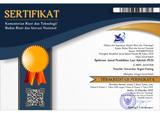HUBUNGAN METODE PENGASUHAN ORANG TUA PADA ANAK DENGAN PERKEMBANGAN KEPERCAYAAN DIRI (SELF CONFIDENCE) ANAK USIA 6-7 TAHUN DI ANAK AIR KELURAHAN BATIPUH PANJANG KOTA PADANG
 ),
), (1) Universitas Negeri Padang
 Corresponding Author
Corresponding Author
DOI : https://doi.org/10.24036/spektrumpls.v8i3.109542
Full Text:
 Language : en
Language : en
Abstract
ABSTRACT
This research was motivated by the low self-confidence development of children aged 6-7 years in Anak Air, Batipuh Panjang Village, Padang City. It is suspected that the cause of the child's low self-confidence is partly due to the inappropriate application of parenting methods. This study aims to: 1) describe the parenting methods applied by parents to children; 2) describes the self-confidence of children aged 6-7 years; and 3) looking at the relationship between parenting methods and the self-confidence of children aged 6-7 years in Anak Air, Batipuh Panjang Village, Padang City.
This research is a correlational quantitative research. The population in this study were children aged 6-7 years and their mothers as many as 50 people with a sample of 75%, namely 38 people with simple random sampling technique. The data technique used a questionnaire and a check for the observation of children's self-confidence development, the data obtained were analyzed using descriptive analysis and formula-data-moment.
The results of this study indicate: 1) the parenting methods applied by parents to children aged 6-7 years are still inaccurate and inconsistent; 2) the development of self-confidence of children aged 6-7 years is still low; and 3) there is a significant relationship between parenting methods and the development of self-confidence of children aged 6-7 years in Anak Air, Batipuh Panjang Village, Padang City. Research suggestions are: 1) it is hoped that parents in Anak Air Kelurahan Batipuh Panjang Padang City can pay attention to and apply the application of parenting methods to children so that they can contribute to the development of children's self-confidence as expected; and 2) it is hoped that further researchers can find or examine other variables that affect the development of children's self-confidence.
Keywords: self-confidence, parenting methods, family education
References
DAFTAR PUSTAKA
Agus, A. R. (2013). Psikologi Sosial: Integrasi Pengetahuan Wahyu dan Pengetahuan Empirik. Jakarta: rajawali pers.
Arikunto, S. (2016). Prosedur Penelitian: Suatu Pendekatan Praktik. Jakarta: Rineka Cipta.
Casmini. (2007). Emotional Parenting. Yogyakarta: Pilar Medika.
Djamarah, S. B. (2012). Psikologi Belajar. Jakarta: Rineka Cipta.
Djamarah, S. B. (2014). Pola Asuh Orang Tua dan Komunikasi dalam Keluarga. Jakarta: Rineka Cipta.
Hakim, T. (2002). Mengatasi Rasa Tidak Percaya Diri. Jakarta: Puspa Swara.
Hurlock, E. B. (2013). Psikologi perkembangan: Suatu Pendekatan Sepanjang Rentang Kehidupan. Jakarta: Penerbit Erlangga.
Ismaniar, I., Jamaris, J., & Wisroni, W. (2018). Pentingnya Pemahaman Orang Tua tentang Karakteristik Pembelajaran AUD dalam Penerapan Model Environmental Print Berbasis Keluarga untuk Meningkatkan Kemampuan Membaca Awal Anak. KOLOKIUM: Jurnal Pendidikan Luar Sekolah, 6(2), 93–100. https://doi.org/10.24036/kolokium-pls.v6i2.9
Latifah; Ismaniar; Sunarti, V. (2018). Gambaran Penanaman Rasa Percaya Diri Anak Usia Dini oleh Guru di Lembaga PAUD Adzkia III Kelurahan Korong Gadang Kecamatan Kuranji Kota Padang. Spektrum: Jurnal Pendidikan Luar Sekolah (PLS), 1(1), 50. https://doi.org/10.24036/spektrumpls.v1i1.9110
Lestari. (2012). Psikologi Keluarga. Jakarta: Kencana Prenada Media Group.
Middlebrook. (1993). Social Psychologi and Modern Life. NY: Alfred A. Knopft, Inc.
Nurmalitasari, F. (2015). Perkembangan Dasar Anak Usia Prasekolah. Buletin Psikologi, 23(2), 103–111.
Pratiwi, H. (2013). Upaya Meningkatkan Rasa Tidak Percaya Diri Anak Kelompok B Melalui Kegiatan Bermain Aktif di TK Pembina Kecamatan Bantul. Universitas Negeri Yogyakarta.
Rahmat, J. (2000). Psikologi Komunikasi. Bandung: Remaja Rosdakarya.
Seguin, D. (2016). New Directions In Parenting Research. Journal of Psychology and Cognition.
Shaleh, A. R. & M. A. W. (2004). Psikologi Suatu Pengantar dalam Perspektif Islam. Jakarta: Kencana Prenada Media Group.
Sugiyono. (2017). Metode Penelitian Kuantitatif, Kulaitatif, dan R&B. Bandung: Alfabeta.
Susanto, A. (2012). Perkembangan Anak Usia Dini. Jakarta: Kencana Prenada Media Group.
Vidya, H., & Mustikasari, S. (2018). Kemandirian Personal Hygiene Anak Usia. 7(1), 51–60.
 Article Metrics
Article Metrics
 Abstract Views : 425 times
Abstract Views : 425 times
 PDF Downloaded : 191 times
PDF Downloaded : 191 times
Refbacks
- There are currently no refbacks.

This work is licensed under a Creative Commons Attribution-NonCommercial 4.0 International License.



